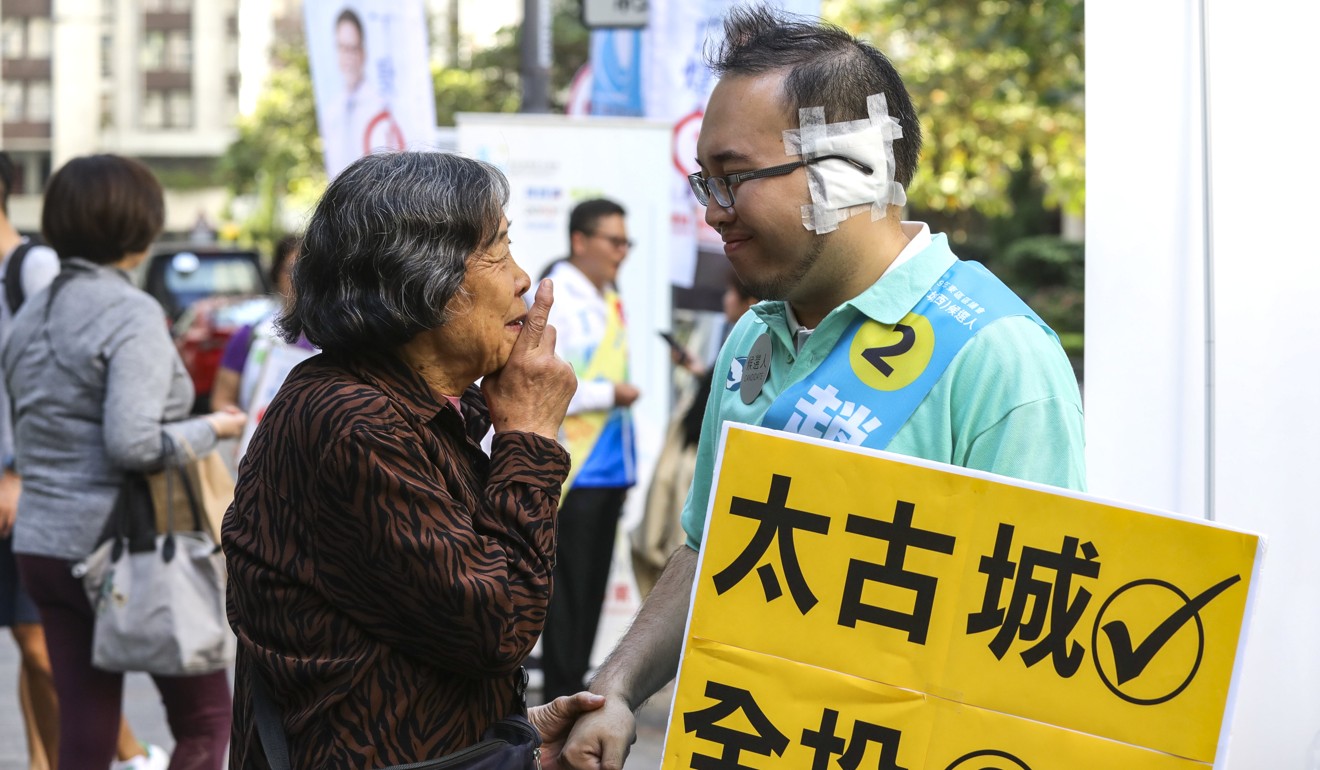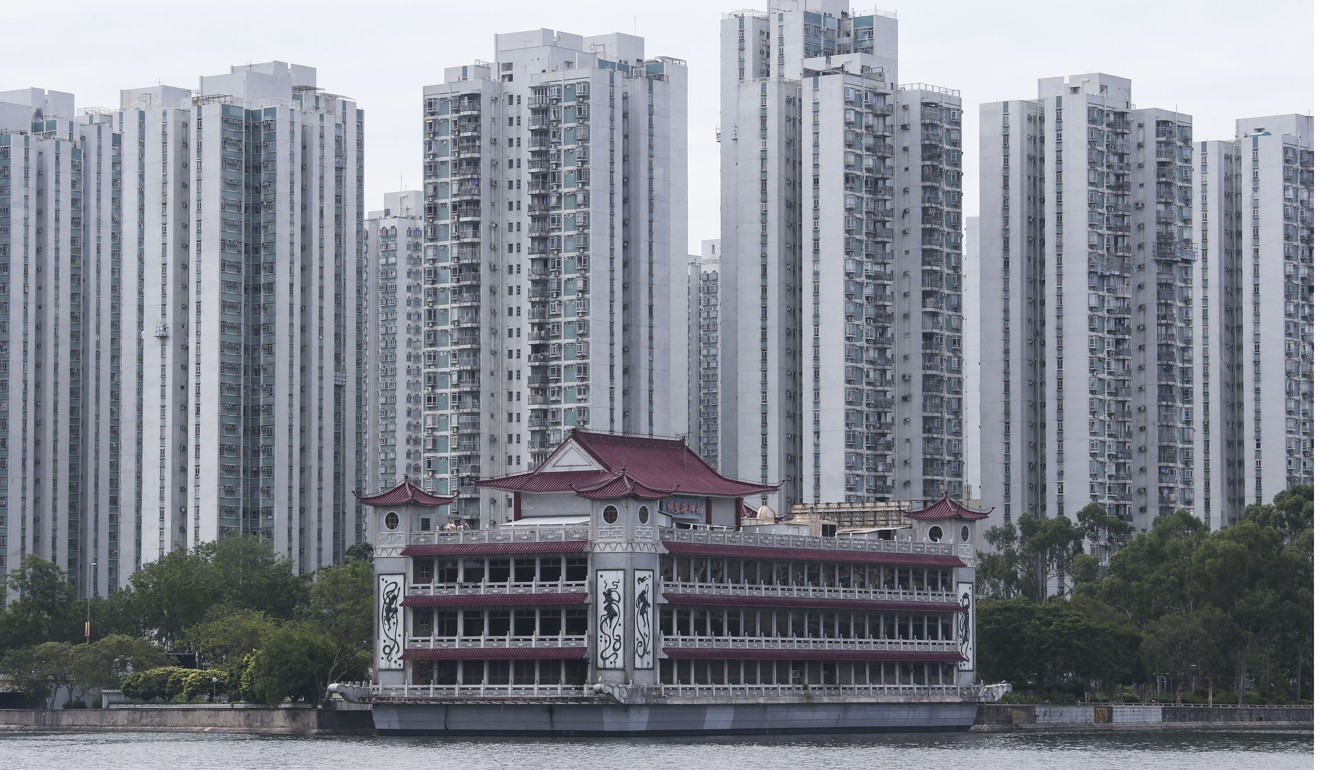Hong Kong elections: middle-class voters desperate to make voice heard as prosperous areas see record turnouts of more than 80 per cent
- Government should pay extra attention to results in constituencies such as City One, a typically middle-class area, Civic Party leader says
- Sunday’s elections are first citywide polls since the unprecedented social unrest broke out in June

Middle-class voters in Hong Kong were desperate to make their voice heard through the ballot box on Sunday amid the ongoing protests as several prosperous constituencies recorded unprecedented turnouts of almost 80 per cent hours before the district council polls closed.
Among them was City One in Sha Tin where the Civic Party’s Leticia Wong Man-huen, a former journalist, ran against pro-establishment candidate Wong Ka-wing, who had served the constituency since 2007.
Some 81.3 cent of voters – 7,922 of 9,744 – had cast their ballots by the close of voting at 10.30pm.
Civic Party leader Alvin Yeung Ngok-kiu, who had been canvassing for Wong, said the turnout in City One was significant.
“City One has been a stronghold of pan-democrats [in Legislative Council elections] but its voters have been represented by a pro-Beijing person on the district council for over 12 years,” Yeung said. “The government should pay extra attention as City One, being a typical middle-class district, reflects how the general middle class think.”
Former Civic Party member Ronny Tong Ka-wah, who quit the party and now sits on the Executive Council, contested the constituency in 2011 but was beaten by Wong by 1,478 votes.
Sunday’s elections are the first citywide polls since the unprecedented social unrest broke out in June – triggered by the now-withdrawn extradition bill – and are regarded by some as a de facto referendum on how the public views the government.
Similar scenes also played out in Lai Chi Kok Central, a middle-class constituency which recorded the highest turnout in the city in 2015, with 65.3 per cent of votes cast. By 10.30pm, 81.9 per cent had voted in the race between pro-establishment candidate Bruce Li Ki-fung and Democratic Party member Ramon Yuen Hoi-man, who was seeking a second term.
More than 73 per cent of voters in Taikoo Shing West had also voted as of 9.30pm. The incumbent, the Democratic Party’s Andrew Chiu Ka-yin, who earlier had part of his ear bitten off during a confrontation between people of different political views, was running against pro-Beijing barrister Kacee Ting Wong.
Chinese University political scientist Dr Ma Ngok believed some middle-class voters, who generally only voted in Legislative Council elections, were now trying to make their voices heard through the district polls.

Traditionally conservative constituencies in Kowloon East had been relatively quiet, Ma said.
Meanwhile, voters were also out in force in several hotly contested constituencies which had caught public attention.
One of them was South Horizons West, where Joshua Wong Chi-fung, the poster boy of the city’s pro-democracy movement, became the only candidate disqualified from the polls on the basis of his political stance.
The fiery battle between Kelvin Lam Ho-por, Wong’s backup candidate, and incumbent councillor Judy Chan Ka-pui drove up the turnout rate of the constituency to more than 79.8 per cent, almost 20 percentage points more than four years ago.
Chan, protégé of New People’s Party chairwoman Regina Ip Lau Suk-yee, was forced to make an emergency appeal to voters from 2pm, but stopped short of saying the high turnout lowered her chances.
“The turnout this time is unprecedentedly high, though this constituency always saw higher-than-average turnouts in previous elections,” she said. “We are not sure who voters side with under such polarising social sentiments.”

Lam also refrained from being optimistic: “Some flats here have been used as police quarters and so the atmosphere has been quite polarised. I hope more youngsters would come out and vote.”
In Tuen Mun’s Lok Tsui constituency, where pro-establishment lawmaker Junius Ho Kwan-yiu – a hate figure for protesters – was seeking re-election, the turnout was 76.5 per cent by the close. He was running against Democrat Cary Lo Chun-yu and independent Chiang Ching-man.
Over in Tsuen Wan’s Hoi Bun constituency, 79.5 per cent of voters had cast their ballot by the close in a race between 26-year old Occupy student leader Lester Shum, conservative incumbent Chow Ping-tim and Mok Yuen-kwan, of the Democratic Alliance for the Betterment and Progress of Hong Kong. The turnout was about double the 39 per cent in the previous poll.
As of 9.30pm, Tsuen Wan had recorded the highest turnout rate of 71.5 per cent, followed by 71.2 per cent in Sha Tin.
Islands district continued to have the lowest rate of 64.9 per cent while Wan Chai came the second last with 66.3 per cent.
Ma said the turnout in Islands remained low because it was low density and had significant portions of rural areas, where the powerful Heung Yee Kuk was in control and people expected few surprises in elections.
Additional reporting by Phila Siu and Linda Lew